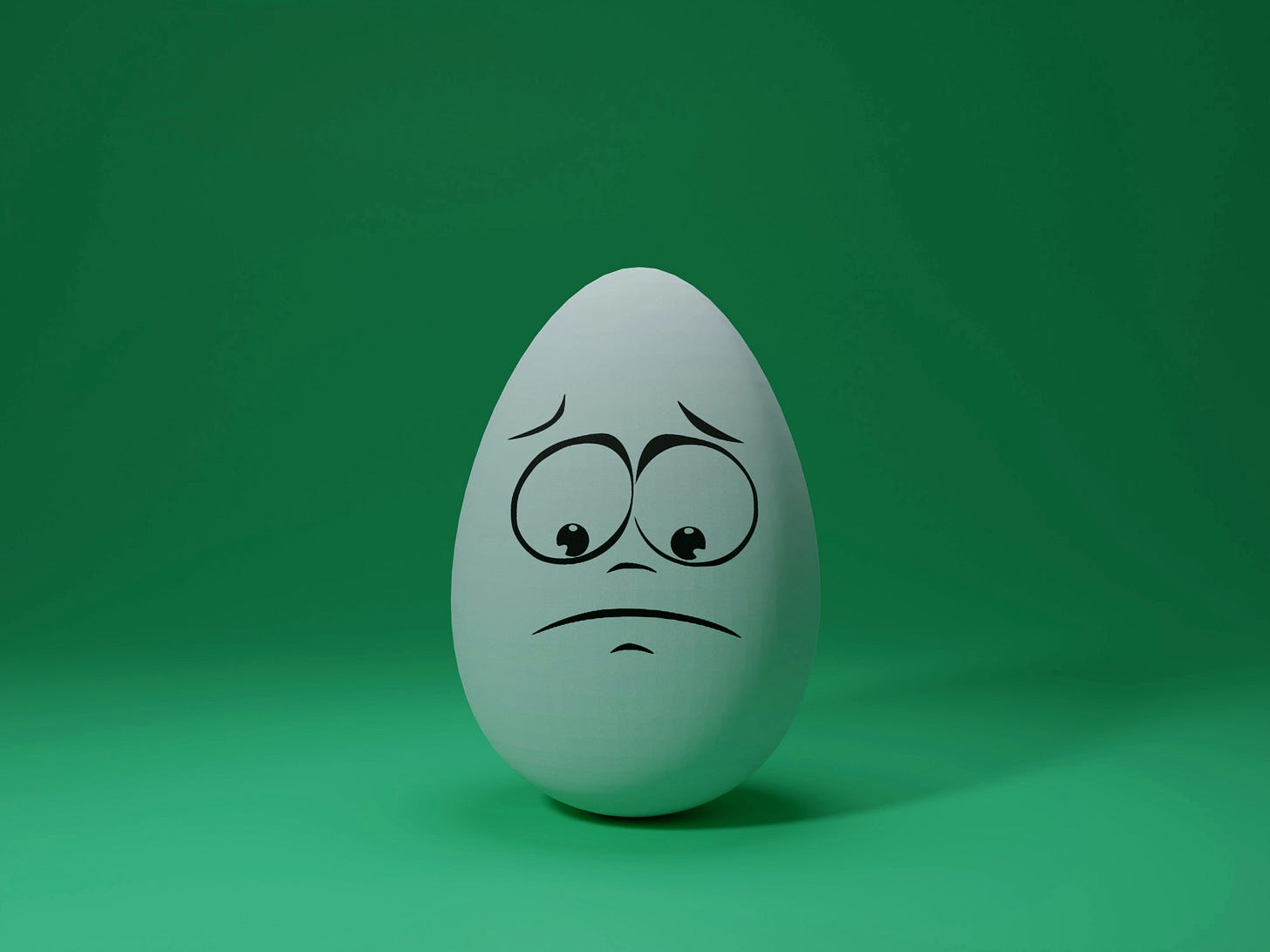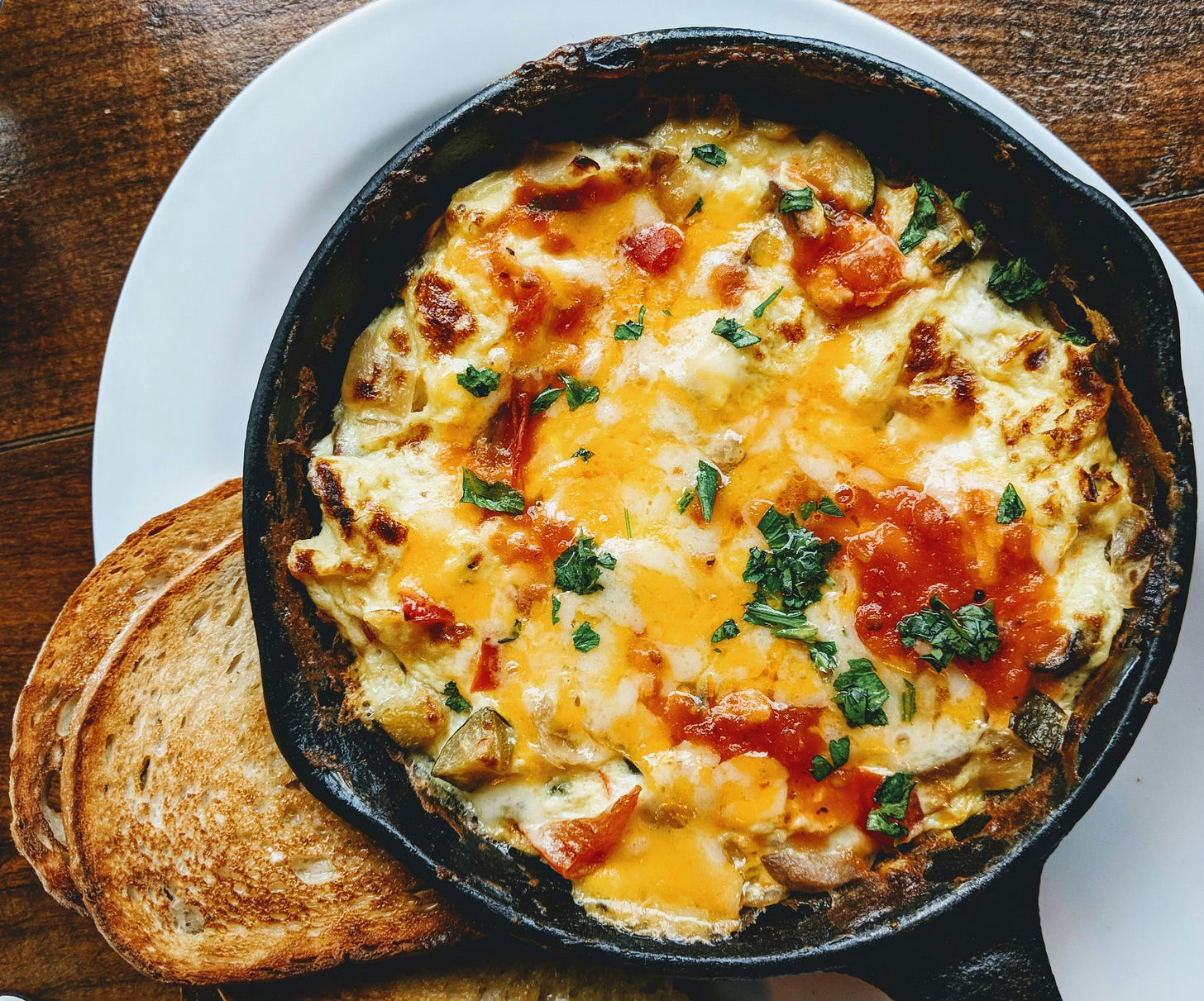Scrambled Eggs
Panic, Parenting, and Neuroscience

In high school, I had to do a psychology project where we carried a raw egg around for a week to simulate the responsibility of having a baby.
The egg went everywhere with us.
If we couldn’t watch it, we had to find an “egg-sitter.”
And if you let it crack? Well so much for your semester grade.
It was fragile, dependent, and a little ridiculous — which was probably the point. At my Catholic girls’ school, the assignment was probably intended to scare us about premarital sex and its potential consequences.
But if they’d really wanted to scare us, they should have designed a teenage egg.
One that stays out until 1 a.m. with its phone off and doesn’t tell you where it is.
Or asks for car keys after you’ve already seen it confuse the brake for the gas.
Or fills its room with suspicious smells and then looks you dead in the eye and says, “No mom, I’m just hanging out with my other eggs. We’re not doing anything.”
Parenting teenagers isn’t just carrying something fragile — it’s watching a raw egg walk around acting like it’s hard-boiled and indestructible.
And that’s where panic sneaks in.
Parenting teenagers isn’t just carrying something fragile — it’s watching a raw egg walk around acting like it’s hard-boiled and indestructible.
Most days the panic isn’t sharp, it’s just there, humming like background noise.
Not a full-blown crisis, but a steady thrum:
Really, you’re picking those friends?
What’s that smell?
Why are your grades sliding when you swore you had it under control?
It’s the ordinary stuff parents of teenagers will recognize instantly.
And the angst makes sense, when we’re in many ways powerless to really change our young adult’s behavior, worrying about them can feel like the only parenting tool we have left.
And my brain? It has a way of skipping straight to the worst-case scenario.
You missed curfew once? Clearly, you’re destined for a lifetime in San Quentin. Found a vape pen? Obviously, I’ll be visiting you in the lung cancer ward.
Forgot your homework? Well, enjoy homelessness by twenty-five.
The leaps are ridiculous… but alarmingly easy to make when it’s your own kid.
And then I came across a line by Yuval Noah Harari the author of Sapiens that pierced straight through all of that:
“Panic is a form of hubris. It comes from the smug feeling that one knows what is going to happen.”
“Panic is a form of hubris. It comes from the smug feeling that one knows what is going to happen.”
I had to set the book down.
Because it named what I hadn’t let myself see.
I thought I was just worrying.
But what I’d been carrying wasn’t small worries. It was fear puffed up into false certainty — the conviction that I already knew the ending, and that the ending was bad.
And that realization came with a sting.
How had I not seen it?
It was my own hubris masquerading as knowing — without any faith in life, let alone my son, to be held by the same grace that carried me through my own dumbass teenage choices.
Or faith that he, too, might have an inner destiny that unfolds outside of my control.
Part of why panic comes so easily is because the stakes feel unbearable.
Our children are our hearts living outside our bodies.
Of course I panic.
And panic isn’t just personal, it’s primal.
We descend from the worrywarts. The cave mom who shrugged, “Eh, junior’s just hanging out at the tar pits, I’m sure it’s fine” didn’t leave descendants.
The cave mom who panicked, hauled him home by the fur pelt, and muttered about his attitude? She’s my great-great-great-great-great-grandmother.
No wonder worry feels like reflex. It kept us alive.
But just because panic was once protection doesn’t mean it’s wisdom now.
And here’s the harder part: when I panic about my son, I’m not just parenting him.
I’m also parenting my past.
Trying to redeem my failures, avert my mistakes, silence the echoes of old wounds.
Panic tells me I’m protecting him.
But really, I’m trying to rewrite myself through him.
And for anyone who has come out of a difficult — dare I say, dysfunctional — marriage, there is nothing more terrifying than catching glimpses of your ex in your offspring.
It’s like watching a shadow you thought you’d left behind slip back into the room wearing your child’s face.
And maybe worry really is baked into the job.
I once went to a psychologist, convinced I had an anxiety issue and perhaps needed medication.
She listened, then shrugged: “You don’t need meds. You just have a teenager.”
Lucky me.
Even when your kid seems like they have their act together, there’s the randomness of life.
And that’s where panic thrives.
Mo Gawdat — who lost his own son in a tragic medical accident at 21 — studied the neuroscience of panic and found the chemical surge only lasts 90 seconds.
If I let it crest and pass — the racing heart, the tight chest — it dissolves.
What prolongs it isn’t biology, it’s imagination.
The “what-ifs” we pile on.
That’s when panic grows claws.
And while the body can remind us that panic passes, sometimes the mind needs help too.
One teacher I’ve turned to is Byron Katie, who developed a practice of questioning stressful thoughts.
Her framework doesn’t erase the panic, but it exposes its arrogance:
” Max is going to end up a homeless man with lung cancer and a criminal record.”
Is it true?
Yup, pretty sure.Can I absolutely know it’s true?
Well… no.Who am I when I believe that thought?
A stressed-out, nagging version of myself who can’t enjoy my kid in the present moment.
We are then invited to consider “other possible outcomes or interpretations” - to “think a better story” - so to speak.
It would be easier, of course, if all parents were more honest about their kids’ screw-ups.
Instead, we polish our social media feeds and Christmas newsletters with the good stuff: honors, trophies, awards.
I think there is such pressure to appear to be “good parents” that it leaves many of us wonder if we are the only ones having “challenging moments”.
Maybe what we really need is a platform called FacePalmBook, where we post the moments that make us hold our heads and mutter, “Seriously?”
“My kid just backed the car into the mailbox… #blessed.”
I suspect we’d all feel a little less alone.
Because the truth is, none of us are here because we or our kids always made good choices.
If life had handed us the full consequences of our own teenage decisions, many of us wouldn’t have made it.
Grace carried us further than we deserved.
That’s why panic screams so loudly.
It’s not just about curfews and car keys.
It’s about our hearts outside our bodies, colliding with our past wounds, reminding us how little control we actually have.
So maybe the work isn’t to silence panic, but to name it for what it is.
To let it crest, breathe through it, and then return to humility.
To remember the story is still unfolding.
And maybe panic only screams this loud because love is whispering underneath it.
The same love that knows even if the egg drops a few times on the floor, there’s still the possibility of a gorgeous omelet.




🫂